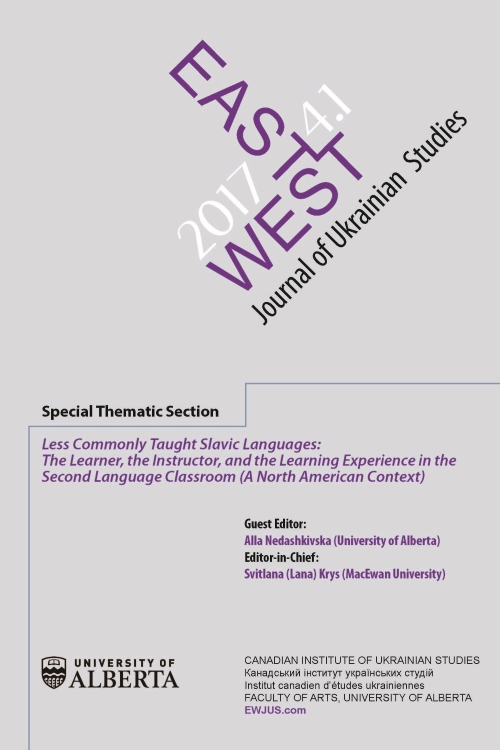Student Motivation Profiles: Ukrainian Studies at the Postsecondary Level in Canada
Student Motivation Profiles: Ukrainian Studies at the Postsecondary Level in Canada
Author(s): Alla Nedashkivska, Olena SivachenkoSubject(s): Language studies, Sociolinguistics, Sociology of Education
Published by: Canadian Institute of Ukrainian Studies at The University of Alberta
Keywords: Ukrainian studies; postsecondary students; student motivation; student demotivation; motivational framework, Ukrainian language;
Summary/Abstract: The study investigates postsecondary student motivation and demotivation for studying Ukrainian language, culture, folklore, literature, linguistics, and history. Four groups of students from one Canadian postsecondary institution are studied: (i) students taking Ukrainian language courses; (ii) those in Ukrainian content courses; (iii) students who took a language course at the postsecondary level in the past but did not continue; and (iv) students active in the Ukrainian community who have never taken any Ukrainian studies courses at the postsecondary level but are potentially interested in Ukrainian studies. The analysis is grounded in Dörnyei’s motivational framework, which categorizes L2 motivation into three levels: the language level (in this study, ‘subject area’), the learner level, and the learning situation level (“Motivation”). The subject area level deals with reasons to learn certain subjects: instrumental and integrative motivation. The learner level focuses on learners’ personality traits and cognition. The learning situation level relates to learning environment. Dörnyei’s framework is employed to develop a motivational questionnaire, used as an instrument. The results are analyzed both quantitatively and qualitatively. The quantitative data are elicited through participant responses to close-ended questions, showing the distribution and significance of various motivational factors in different groups of students under study. The qualitative analysis is based on participant responses to open-ended questions, allowing us to analyze both responses and perspectives on how their motivation relates to learning experience and the learning process overall. The combination of the two methods of analysis contributes to a multi-faceted understanding of motivational factors and yields pedagogical implications. The article concludes with a list of recommendations that stem from these analyses.
Journal: East/West: Journal of Ukrainian Studies (EWJUS)
- Issue Year: 4/2017
- Issue No: 1
- Page Range: 63-94
- Page Count: 32
- Language: English

